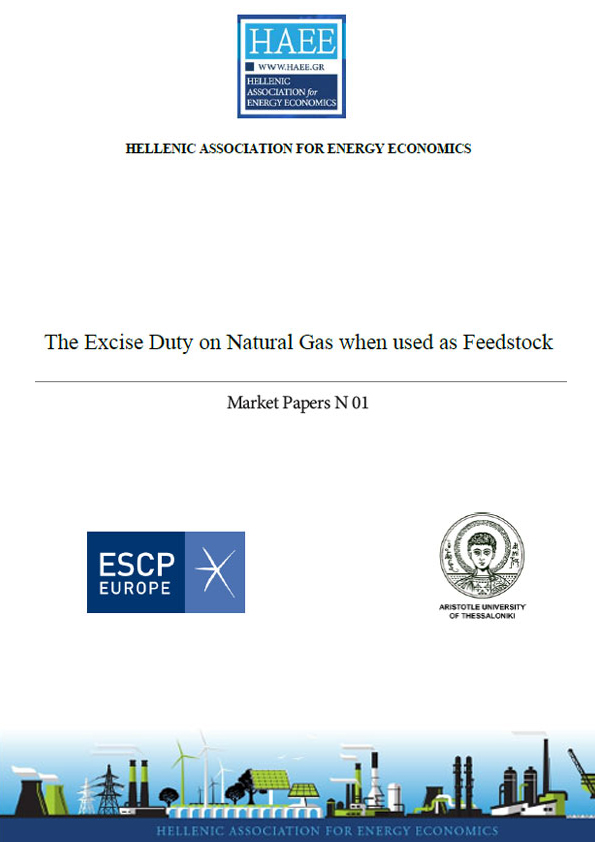Tel: +30 210 92 30 422
E-mail: info@haee.gr
Address
62, Charilaou Trikoupi Str.
Kifissia, 14562
Athens, Greece

Unexpectedly, even though natural gas is broadly considered as the most environmentally friendly product, the excise duty related to feedstock appliances remains until today. The imposition of excise duty merely on natural gas when used as feedstock acts counter to the nature and logic of the tax system, both at EU and national level. Undeniably, this imposition negatively affects economic activity and competitiveness of products that use natural gas as raw material.
The abolition of excise duty when natural gas is used as a feedstock is indicated by the Directive 2003/96/EC. Hence, based on the relevant Community Law, the abolition of excise duty charges for industrial purposes as feedstock will directly reduce production costs and at the same time have a beneficial impact on business competitiveness. Eventually, a potential abolition considering the industrial application would be significantly beneficial in terms of broader economic activity. Above all, a key policy tool that is directly relevant to the reduction of natural gas prices is the complete abolishment of excise duty rate when used as feedstock.
Nowadays, the Greek economy is in a steady phase towards growth, hence there is an urgent need to smooth out any obstacle that prevents the quick recovery of the economy. Strengthening the role of industries is a key prerequisite in order to achieve the aforementioned goal. Reduced cost of production is anticipated to trigger a direct outcome of providing lower cost products, that eventually could increase domestic demand and in parallel be accompanied by positive externalities in the overall Greek economy.
Natural gas is the fastest growing form of primary energy worldwide, given its advantages compared to other forms of energy and its pivotal contribution to the direction of sustainable development. Moreover, natural gas is widely considered an essential element for the promotion of the European Energy Policy and the European 20-20-20 target; fact that allows natural gas to be the dominant energy choice of the European Union (EU) for the 21st century and, at the same time, the bridge for the transition from conventional to renewable energy forms. In this sense, natural gas is the most efficient and environmental friendly feedstock for ammonia production.
Aiming to deliver a comprehensive assessment of the role that natural gas plays in shaping industrial competitiveness, the following study has carefully examined various aspects considering the implementation of excise duty on natural gas in order to propose particular policies. Precisely, the excise duty in Greece has been extremely high at € 1.5 / GJ (around € 5.4 / MWh) since 2011 and applied to all industrial uses. The outcome of the particular policy that emerged after the implementation was disturbing especially for the Greek fertilizers which, in addition to the rising cost due to international factors and the deteriorate functioning of the domestic market, faced and still faces a supplementary cost by the implementation of the excise duty on natural gas.
Nowadays, the Greek economy is in a steady phase towards growth, hence there is a pressing need to smooth out any obstacle that prevents the quick recovery of the economy. Strengthening the role of industries is a key prerequisite in order to achieve this exact goal. Under the specific circumstances, there is a need to identify effective policies that can eventually lead to an improved and fair taxation of energy products, which eventually are anticipated to assist industrial competition both domestically and at international level.
At this point in time, it is a priority to examine ways and strategies, designed to boost the Greek economy back to the path of growth. The abolition of excise duty when natural gas is used as feedstock should be considered a strategy towards this direction, which ultimately, is indicated by the Directive 2003/96/EC. Hence, based on the relevant Community Law, the abolition of excise duty charges regarding natural gas when used as feedstock will directly reduce production costs and at the same time have a beneficial impact on industry competitiveness. Eventually, as the present study explicitly clarifies, a potential abolition from natural gas when used as feedstock would be significantly beneficial in terms of broader economic activity.
*If you have purchased a license for this file, you will find the password to unlock the file in the details page of the corresponding order in the members area.
